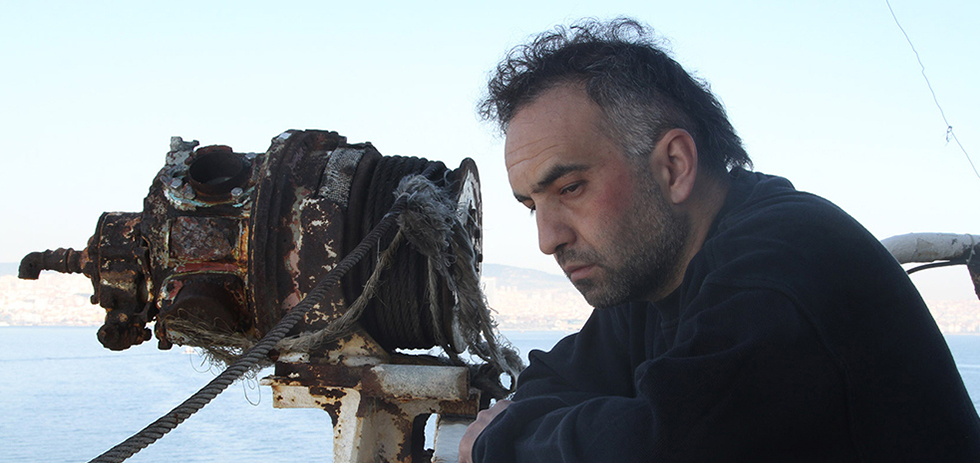Ivy is both a deeply intertextual tribute to the idea of ‘being at sea’, but also the literary world that has romanticised the notion so relentlessly in the past. It plays tribute to Moby Dick, quotes Coleridge, and references Joseph Conrad throughout. That said, it isn’t an adaptation of any of these authors, instead, standing alone as a deeply original and thoughtful work that is constantly ahead of its audience; like the ship the crew inhabit, constantly changing course and redefining expectations. Tolga Karacelik, one of Turkey’s most prominent up and coming filmmakers, helms the film as his second feature length while Nuri Bilge Ceylan’s placement as Ivy’s producer is felt throughout. The general plot of the piece revolves around a group of men being stuck at sea after refusing to leave at the last stop in hope of getting their payment for their work up until the point that the film commences.
Ivy is driven, in particular, by its ensemble cast who transform the deck of the ship into a stage for anguish, frustration, paranoia and mistrust. Initially, the crew are driven by a desperation for getting paid and a vague hope that remaining on the ship after many have departed in protest is the best way to do this. Each character is Karacelik’s attempt to present a full spectrum of emotional reaction to the dilemma of the men. Beyond the unstable and towering Beybaba -the ship’s captain -, Ismael 1 stands as the de facto leader of the crew. Although his only real tasks are to direct the men to do some of the work he is already finding himself doing, it turns out that alone is enough in the context of being at sea to create a deeply divided ship. Cenk, on the other hand, is short-tempered and pushes a lot of the plot development with his bursts of frustration. The crew is broadened through the uncertain Alper, the constantly tense and self-effacing Nadir, and the outcast and introverted Kurd.
Ivy’s greatest strength is in Karacelik’s pacing of the film. The director sits in absolute control, and works in extraordinary long takes to shift and transform the iterations of power on the ship. The vicissitudes of the interactions of the men are fascinating to watch. Drifting and out of paranoia at different stages, their vulnerabilities are given time to come to the surface in fair doses throughout the film, and Karacelik is able to deconstruct the idea of their being any “leader” by the time the film concludes. He creates a stage of an almost creative chaotic mutual mutiny. Tension slides into paranoia, and finally abject chaos as a supernatural element creeps into the film. Ivy’s strength is in its ability to drip entirely into this all-consuming fever dream before emerging leaving a scene of utter and total desperation to close the film.
The film finds some shortcomings in unexplored ideas, in particular the character of Kurd. An odd and out of place Kurdish outsider, being referred to simply as “Kurd” doesn’t do any favours in humanising him. Despite this, he comes off as the sole character deserving of any sympathy by the films conclusion; by the time of which, he’s disappeared from the ship. Kurd is used as a supernatural motif, when there’s a lot of room for his positioning on the ship and his racially-designated pariah status to be explored. He’s a fascinated, complex and unused character and it feels like one of Karacelik’s greatest shortcomings in the film for doing so.
Nuri Bilge Ceylan’s presence as the films producer is more than it first seems, with the film mirroring a lot of the astounding visuals that define Ceylan’s own works. Most likely is the presence of Gokhan Tiryaki, Ceylan’s cinematographer, who lends Ivy his trademark crispness, detail and hunger for a intricate depth-of-frame. It’s hard to understate the presence of Tiryaki’s visuals in the film, which is arguably what brings its strongest moments. On top of his previous work, Ivy asserts Tiryaki as one of the 21st century’s most defined and talented cinematographers in the industry. All in all, Ivy is a cinematically well-shot and imaginative riff on sea mythology, and serves as a strong point in favour of the argument that Tolga Karacelik is one of Turkey’s most important up and coming filmmakers.

